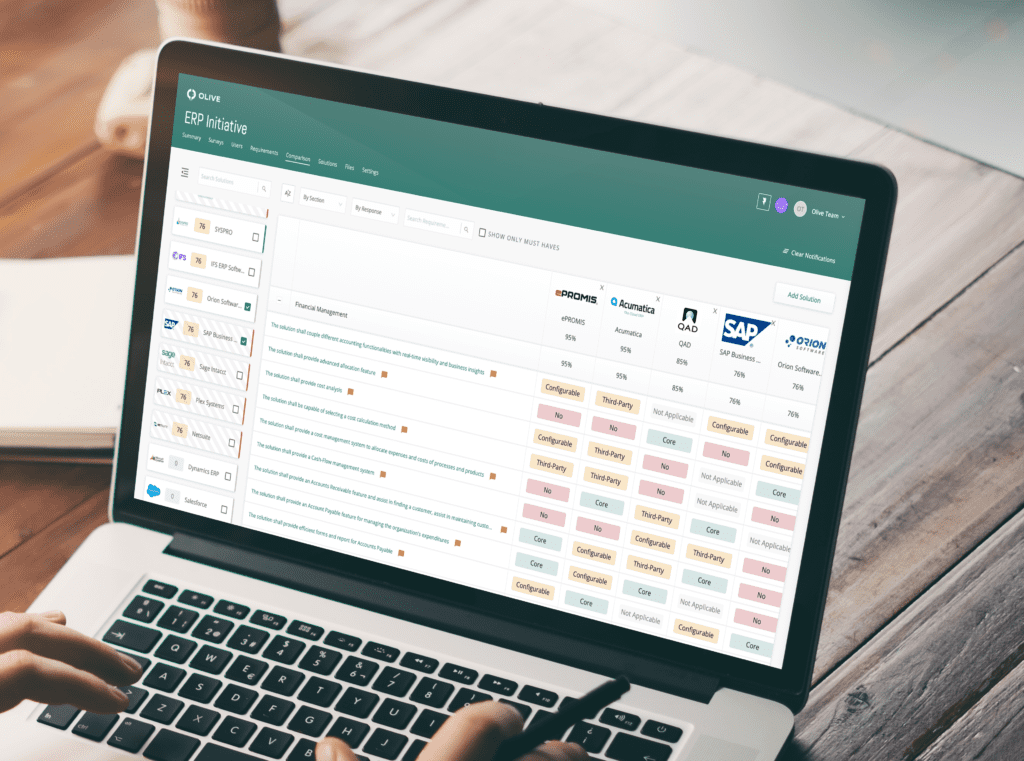
Collaborate to Compare and Source ERP Solutions in Olive
Discover the perfect ERP solution with Olive Technologies. Collaborate, evaluate, and source confidently for your organization’s needs.
Sourcing the right ERP system for your organization’s needs can help businesses achieve goals, improve competitive position, and increase profitability. Relying on hype, biased opinions, or incentivized reviews when sourcing ERP vendors can lead to costly mistakes. Olive’s AI-driven software sourcing platform makes it easy to collaborate with department heads and compare vendors to your unique business needs.
Gartner, G2, and Capterra provide a good starting point by giving you an overview of the top-reviewed ERP vendors. However, it’s essential to evaluate multiple solutions thoroughly to make an informed decision.
Don’t settle for a subpar ERP solution that will cost you in the long run. With Olive, you can speed up the ERP Sourcing process, de-risk your decision and make the right choice for your organization.
The Best ERP Insights from Our Blog and Community
Olive’s ERP Selection Guide
How to find the Best ERP Platform for your unique business needs.

Download our ERP Selection Guide
Sourcing ERP Solutions can be daunting. Your ERP Software can impact your entire organization, which makes getting the decision right, very important.
Olive’s ERP Selection Guide gives you a step-by-step process to unlock the incredible benefits of the right ERP software and helps avoid becoming another cautionary ERP tale.
More ERP Sourcing Insights to Help You Make the Right Choice
Success Stories: How Companies Source Software and Streamline RFPs with Olive

PRMI Uses Olive to Source Software

Kong Sources HR Software with Olive

Flynn uses Olive for Software Sourcing and Procurement

Freddy’s Streamlines POS Sourcing with Olive

Streamline Your ERP Evaluation
3x Faster Time to ERP Vendor Decision
Olive users take less time to source, evaluate, and implement ERP solutions. Increased collaboration amongst key stakeholders reduces delays caused by miscommunication, outdated processes, conflicting priorities, and lack of alignment.

Maximize Your Team’s Efficiency with Olive’s ERP Project Templates
Kick-off your organization’s ERP evaluation with Olive’s pre-created project template. Project pre-loaded with;
- Discovery Surveys
- Standard Requirements
- User Feedback
- List of Vendors
- Vendor Responses to Requirements
ERP Vendor Comparative Analysis
In Olive, ERP vendor scores are automatically calculated. Compare vendors side by side based on specific requirements. Dynamic auto calculations ensure that scores continuously update as stakeholders evaluate vendor responses. The platform also offers the flexibility to assign different weights to various sections or departments when calculating vendor scores. This data-driven approach enables unbiased decision-making, free from any bias.


Score ERP Vendors Based on Response to Requirements
Olive allows stakeholders to review vendor responses for each requirement and then score those responses based on how well it will meet their needs. All stakeholder responses are calculated automatically and presented as an overall score at the requirement, section, and solution level.

Streamline your ERP RFP Process
Olive users streamline the ERP RFP Process and unlock software sourcing success.
Get Started With Olive Today
Submit the form and create your account in Olive.
Your ERP Questions Answered
In the complex world of Enterprise Resource Planning (ERP) systems, there’s a lot to consider. From understanding the latest trends to evaluating potential risks, it’s essential to have answers to your most pressing questions. We’ve put together a collection of the internet’s most searched ERP Discovery questions.Here, we address a wide range of inquiries about ERP systems and provide links to resources to help guide you through the process of finding the perfect solution for your organization.
What are the latest trends in ERP systems?
ERP systems have evolved significantly in recent years, with several emerging trends shaping the landscape. These include the rise of cloud-based ERP solutions, increased focus on AI and machine learning capabilities, enhanced mobile functionality, and a shift towards industry-specific solutions. We discuss some of these ERP trends in depth here!
How has the ERP landscape evolved in the past few years?
The ERP landscape has undergone significant changes, moving from traditional on-premise systems to more agile and scalable cloud-based solutions. There’s also been a greater emphasis on user experience, integration with emerging technologies, and customization to meet specific industry needs.
What are the common challenges companies face when selecting an ERP vendor?
Common challenges include defining specific requirements, aligning ERP strategy with business objectives, evaluating vendor credibility, managing implementation costs, and ensuring user adoption.
What are the key considerations for companies transitioning from legacy systems to ERP?
Key considerations include data migration, training requirements, business process reengineering, system integration, and change management.
How do companies determine if they need to upgrade or replace their current ERP system?
Companies evaluate the need for an ERP upgrade or replacement based on factors such as system age, functionality gaps, scalability issues, regulatory compliance, and alignment with business goals.
What are the steps involved in the ERP selection process?
The ERP selection process typically involves defining requirements, researching vendors, issuing RFPs, evaluating proposals, conducting demos, negotiating contracts, and selecting a vendor.
How do companies determine their budget for ERP implementation?
Companies determine their ERP budget based on factors such as software licensing costs, implementation services, customization, training, ongoing support, and potential ROI.
What are the potential risks associated with selecting the wrong ERP vendor?
Potential risks include project delays, budget overruns, implementation failures, data security breaches, and negative impacts on business operations.
What are the benefits of conducting a readiness assessment before selecting an ERP vendor?
Conducting a readiness assessment helps identify potential challenges, assess organizational readiness for change, and develop strategies to mitigate risks.
What role do consultants play in the ERP vendor selection process?
Consultants provide expertise in defining requirements, evaluating vendors, facilitating negotiations, and overseeing implementation to ensure project success.
How do companies identify their ERP system requirements?
Companies identify ERP requirements through stakeholder interviews, process mapping, gap analysis, and benchmarking against industry standards.
What strategies do companies use to prioritize their ERP system requirements?
Companies prioritize requirements based on business criticality, strategic alignment, regulatory compliance, and potential impact on efficiency and productivity.
What are the implications of choosing a vendor-agnostic ERP system versus an industry-specific one?
Vendor-agnostic systems offer greater flexibility and customization, while industry-specific systems provide pre-built functionality tailored to specific verticals.
How do companies ensure alignment between their ERP strategy and overall business objectives?
Companies ensure alignment by involving key stakeholders, defining clear objectives, conducting regular reviews, and adapting the ERP strategy as needed.
What are the key factors to consider when creating an ERP implementation timeline?
Key factors include project scope, resource availability, dependencies, milestones, and potential risks.
How do companies evaluate the impact of ERP implementation on their workforce?
Companies assess workforce impact through change management initiatives, training programs, and feedback mechanisms to ensure smooth transition and adoption.
What are the differences between ERP systems designed for small businesses versus large enterprises?
ERP systems for small businesses are typically simpler, more affordable, and easier to implement, while those for large enterprises offer scalability, customization, and integration with complex systems.
How do companies identify potential ROI from implementing an ERP system?
Companies identify potential ROI by quantifying benefits such as increased productivity, cost savings, revenue growth, and improved decision-making capabilities.
What are the potential pitfalls companies should be aware of during the ERP vendor selection process?
Potential pitfalls include inadequate requirements gathering, lack of due diligence, over-reliance on vendor claims, and failure to consider long-term support and maintenance.
How do companies determine the level of vendor support needed during and after ERP implementation?
Companies determine support needs based on factors such as internal IT capabilities, system complexity, vendor responsiveness, and budget constraints.
What are the implications of choosing an ERP system that is hosted on-premise versus in the cloud?
On-premise systems offer greater control and security but require higher upfront investment and ongoing maintenance, while cloud-based systems offer scalability, accessibility, and cost-effectiveness but may raise data security concerns.
How do companies ensure data integrity and security during the ERP vendor selection process?
Companies ensure data integrity and security by evaluating vendors’ data protection measures, compliance with industry standards, and track record of handling sensitive information.
What are the best practices for engaging stakeholders in the ERP vendor selection process?
Best practices include involving stakeholders early and often, addressing concerns and expectations, providing regular updates, and soliciting feedback throughout the process.
What are the key factors to consider when selecting an ERP implementation team?
Key factors include expertise in ERP systems, project management skills, domain knowledge, communication skills, and ability to work collaboratively.
How do companies ensure transparency and accountability in the ERP vendor selection process?
Companies ensure transparency and accountability by documenting selection criteria, decision-making processes, and vendor evaluations, and involving relevant stakeholders in key decisions.
What are the potential benefits of attending ERP vendor expos and conferences?
Attending ERP vendor expos and conferences provides opportunities to network with industry experts, learn about the latest trends and innovations, and evaluate multiple vendors in one place.
How do companies leverage industry research and reports when selecting an ERP vendor?
Companies leverage industry research and reports to identify leading vendors, understand market trends, compare features and functionalities, and validate vendor claims.
What are the differences between ERP systems built on proprietary versus open-source platforms?
Proprietary ERP systems offer pre-built functionality, vendor support, and proprietary licensing, while open-source ERP systems offer flexibility, customization, and lower initial costs but may require more technical expertise and ongoing maintenance.
How do companies evaluate the scalability of potential ERP solutions?
Companies evaluate scalability based on factors such as system architecture, performance testing, customer references, and vendor roadmaps for future enhancements.
What are the best strategies for negotiating contracts with ERP vendors?
Best strategies include conducting thorough research, understanding pricing models, negotiating on key terms, seeking discounts, and ensuring clarity on deliverables and support services.
Embarking on the journey of sourcing an ERP system is a significant decision for any organization. While researching online is crucial, thorough evaluation of vendors is equally important to find the best fit for your organization’s needs and budget. Remember, ERP systems are investments that can yield substantial returns when implemented correctly. By addressing your ERP questions, conducting thorough research, and evaluating vendors based on your specific requirements, you can make an informed decision that sets your organization up for success in the long run. For more information on selecting your organization’s best fit ERP, check out our ERP Selection Guide!




